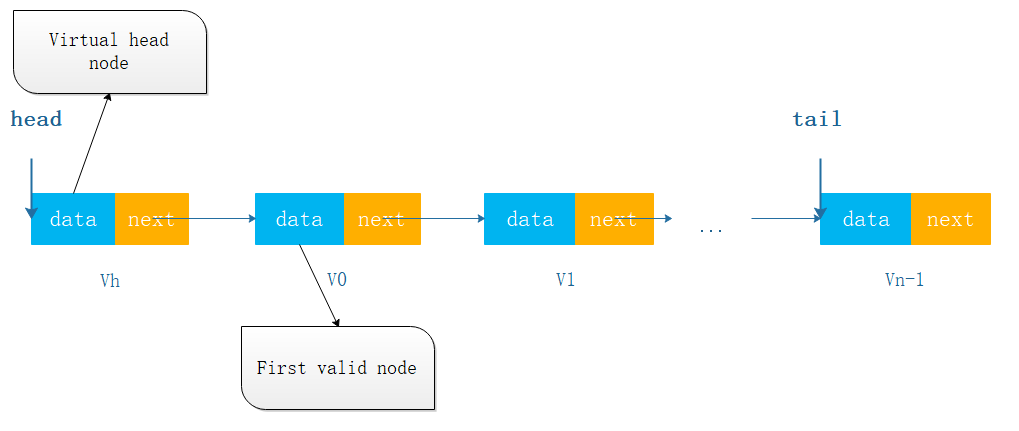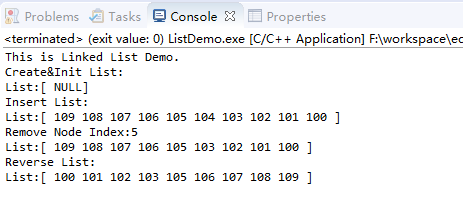本文例程下载链接:ListDemo
链表 vs 数组
链表和数组的最大区别在于链表不支持随机访问,不能像数组那样对任意一个(索引)位置的元素进行访问,而需要从头节点开始,一个一个往后访问直到查找到目标位置。
单链表
与顺序表相对,链表是一种链式存储方式。单链表是实现顺序表最简单的一种链表,根据是否包含虚拟头节点,分为含虚拟头节点和不含虚拟头节点两种方式。本文以含虚拟头节点为例,用C++实现单链表数据结构ADT。
节点:链表的组成元素,每个节点包含数据域data和指针域next。例程为了简化设计,data用int类型表示。
虚拟头节点:链表的第一个节点,为了维护链表操作方便,但不存放数据。
虚拟头节点(dummy head) VS 无虚拟头节点
含虚拟头节点的链表优势:所有的数据节点(除去头节点)都是对等的,对链表节点的API操作一般不影响头节点本身指针变化(除去头节点next域)。
缺点:需要额外考虑头节点影响,比如IsEmpty()判断条件, 和Length()是否对等(IsEmpty <=> length==0?),头节点对用户是否可见,能否被用户直接remove等。
单链表结构设计
含虚拟头节点的单链表list如下图所示,包含一个虚拟头节点V0,而V1~Vn通过前驱节点next域进行链接,从而形成一个单向链式结构。
虚拟头节点V0,不包含数据;V1~Vn包含数据,Vn->next = NULL
| 名称 | 描述 | 代表自定义符号 |
| 虚拟头节点 | 不包含数据 | Vh/head |
| 尾节点 | 链表的最后一个节点,特征:next=NULL | Vn-1/tail |
| 普通数据节点 | 包含具有实际意义数据的节点 | V0~Vn-1 |
| 长度 | 包含实际意义数据节点数为n(不包括Vh) | length |
| 空链表 | 虚拟头节点为空,即head=NULL | V0=NULL |
| 位置 |
从V0开始(Vh后继节点)开始计数0,直到Vn-1(尾节点)的节点对应位置。范围[0,n-1] |
position |
| 插入节点 | 在指定位置处插入节点,除插入节点及前驱和后继,不改变链表其他节点关系 | insert |
| 删除节点 | 在指定位置处删除节点, 除插入节点及前驱和后继,不改变链表其他节点关系 | remove |

单链表ADT设计
1. 链表节点ADT Node.h
/**
* 单链表节点类
*/
class Node
{
int data;
Node *next;
public:
Node();
Node(Node*, int);
};
2. 单链表ADT LinkedList.h
/**
* 单链表类
* @description 带虚拟头节点
*/
class LinkedList
{
private:
Node *head;
Node *tail;
public:
LinkedList();
virtual ~LinkedList();
Status Init(); // 初始化链表
Status Destroy(); // 销毁链表
int Length(); // 求链表长度(有效节点)节点个数
bool IsEmpty(); // 链表是否为空
Status Insert(int pos, int value); // 在指定位置生产节点, 并插入数据
Status Remove(int pos); // 删除指定位置节点
int GetValue(int pos); // 读取指定位置节点数据
Node* GetAddress(int pos); // 获取知道位置节点的地址
int SearchPosition(int value); // 搜索第一个出现的元素值的节点位置
Status Update(int pos, int value); // 更新指定位置节点数据
Status ClearList(); // 清除链表数据(不包含头节点)
Status PrintList(); // 顺序打印链表节点数据
Status Reverse(); // 反转链表
};
3. Node实现 Node.cpp
#include "Node.h"
#include <cstdlib>
Node::Node() {
data = 0;
next = NULL;
}
Node::Node(Node* newNext, int newValue)
{
data = newValue;
next = newNext;
}
Node::~Node()
{
// TODO Auto-generated destructor stub
}
4. 链表实现LinkedList.cpp
#include "LinkedList.h"
#include <cstdlib>
#include <iostream>
using namespace std;
LinkedList::LinkedList() {
head = NULL;
tail = NULL;
}
LinkedList::~LinkedList() {
Destroy();
}
/**
* 初始化链表
*/
Status LinkedList::Init()
{
// 创建虚拟头节点
head = new Node(NULL, 0);
if(head != NULL)
{
return OK;
}
return ERROR;
}
/**
* 销毁链表
* @description 与初始化操作相对, 删除所有链表节点, 包括头节点
*/
Status LinkedList::Destroy()
{
if(head)
{
Node *curP = head;
while(head)
{
curP = head->next;
delete head;
head = curP;
}
return OK;
}
else
{
cout <<"The list is NULL"<<endl;
return ERROR;
}
}
/**
* 求链表长度(有效节点)节点个数
* @description 从虚拟头节点的下一个节点开始计算有效节点数
*/
int LinkedList::Length()
{
if(!head)
{
cout <<"The list is NULL"<<endl;
exit(-1);
}
Node *curP = head->next;
int n = 0;
while(curP != NULL)
{
n ++;
curP = curP->next;
}
return n;
}
/**
* 判断链表是否为空
* @description 判断依据: 虚拟头节点head == NULL
* 注: 长度为0 不代表链表为空
*/
bool LinkedList::IsEmpty()
{
return (head == NULL);
}
/**
* 在指定位置生产节点, 并插入数据
* @param pos [in] 待插入位置. 从头节点的后继开始为0计数,所需要经过的节点数。范围:0~n-1
* @param value [in] 待插入节点数据域
*/
Status LinkedList::Insert(int pos, int value)
{
if(IsEmpty())
{
cout <<"The list is NULL. Pls Create an List and init it first."<<endl;
exit(-1);
}
// create a new Node
Node *newNode = new Node(NULL, value);
if(pos == 0)
{
newNode->next = head->next;
head->next = newNode;
}
else if(pos >0 && pos <= Length())
{
// find the predecessor node to be inserted
Node *p = GetAddress(pos-1);
// insert the new Node to List
if(p != NULL)
{
if(p->next != NULL)
{// not tail
newNode->next = p->next;
}
p->next = newNode;
}
}
else
{
cout<<"Error: Input param Pos is illegal(<0)"<<endl;
return ERROR;
}
return OK;
}
/**
* 删除指定位置节点
* @param pos [in] 待插入位置. pos有效范围: [0, n), 0代表虚拟节点后面一个节点, 虚拟节点无法通过此API删除
*
*/
Status LinkedList::Remove(int pos)
{
Node *preNode = NULL;
Node *curNode = NULL;
Node *nextNode = NULL;
if(pos < 0 || pos >= Length())
{
cout << "Remove node with error position"<<endl;
exit (-1);
}
else if(pos == 0)
{// find the prior node, namely , head node
preNode = head;
}
else if(pos < this->Length())
{
// find the prior node
preNode = GetAddress(pos - 1);
}
if(!preNode)
{
return ERROR;
}
curNode = preNode->next;
if(curNode)
{
nextNode = curNode->next;
preNode->next = nextNode;
delete curNode;
}
return OK;
}
/**
* 读取指定位置节点数据
*/
int LinkedList::GetValue(int pos)
{
// find the node
Node *curP = GetAddress(pos);
if(curP != NULL)
{
return curP->data;
}
else
{
return 0;
}
}
/**
* 获取位置节点的地址
* @param pos [in] 从头节点的后继开始为0计数,所需要经过的节点数。范围:[0, n-1], n是链表长度(有效数据节点数)
* @return 节点的地址
*/
Node* LinkedList::GetAddress(int pos)
{
// valid list is null or not
if(!head)
{
cout <<"The list is NULL"<<endl;
exit(-1);
}
// valid intput param
if(pos < 0 || pos >= Length())
{
cout <<"Insert position is out of the list's bounds"<<endl;
exit(-1);
}
// 顺序查找位置pos的节点
int i = 0;
Node *curP = head->next;
while(curP != NULL)
{
if(i == pos)
{
return curP;
}
i ++;
curP = curP->next;
}
return NULL;
}
/**
* 搜索第一个出现的元素值的节点位置
* @param value 待查找值
* @return 链表第一个节点的数据域=value的位置
* - ERROR 错误
* - >=0 位置序号
*/
int LinkedList::SearchPosition(int value)
{
// valid list is null or not
if(!head)
{
cout <<"The list is NULL"<<endl;
exit(-1);
}
// sequential search
Node *p = head->next;
int i = 0;
while(p != NULL)
{
i ++;
if(p->data == value)
return i;
else
p = p->next;
}
cout<< "Can't find the value in list"<<endl;
return ERROR;
}
/**
* 更新指定位置节点数据
* @param pos [in] 待更新节点位置
* @param value [in] 待更新节点要修改的目标值
* @return 更新结果
* - OK 正常更新
* - ERROR 没有找到待更新节点, 可能由位置错误或者链表为空导致
*/
Status LinkedList::Update(int pos, int value)
{
// find the node
Node *curP = GetAddress(pos);
if(curP != NULL)
{
curP->data = value;
return OK;
}
return ERROR;
}
/**
* 清除链表数据(不包含头节点)
*/
Status LinkedList::ClearList()
{
// valid list is null or not
if(!head)
{
cout <<"The list is NULL"<<endl;
exit(-1);
}
Node *p = head->next;
Node *tmp = NULL;
while(p!=NULL)
{
tmp = p;
p = p->next;
delete tmp;
}
head->next = NULL;
return OK;
}
/**
* 顺序打印链表节点数据
*/
Status LinkedList::PrintList()
{
// valid list is null or not
if(IsEmpty())
{
cout <<"The list is NULL. Pls Create an List and init it first."<<endl;
return ERROR;
}
cout <<"List:[ ";
if(Length() == 0)
{
cout<<"NULL";
}
else
{
Node *p = head->next;
while(p != NULL)
{
cout<<p->data<<" ";
p = p->next;
}
}
cout <<"] "<<endl;
return OK;
}
/**
* 反转链表, 除虚拟头节点
*/
Status LinkedList::ReverseList()
{
// valid list is null or not
if(IsEmpty())
{
cout <<"The list is NULL. Pls Create an List and init it first."<<endl;
exit(-1);
}
if(Length() == 0)
{
cout <<"The list length = 0. Pls insert new Node."<<endl;
exit(-1);
}
// reverse List
Node *pre = head->next; // precursor Node
Node *cur = pre->next; // current Node
Node *nxt = NULL; // successor Node
while(cur != NULL)
{
nxt = cur->next;
cur->next = pre;
pre = cur;
cur = nxt;
}
// set the tail Node
head->next->next = NULL;
// set the head Node's next field
head->next = pre;
return OK;
}
6. 测试结果
可以看到已经实现了链表基本的插入、打印、反转等功能。
